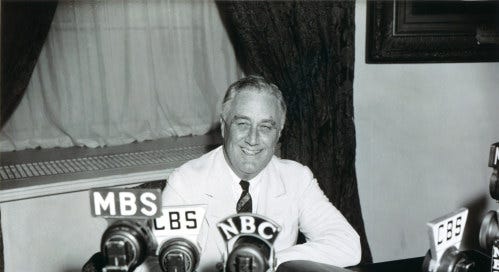March 12, 1933
FDR’s First Radio Address
Today is our first excerpt from the first of FDR’s famous “Fireside Chats”, where he put his vision before the American people — meeting them where they were (radio) and using language they understood.
All emphasis mine.
My friends, I want to talk for a few minutes with the people of the United States about banking — with the comparatively few who understand the mechanics of banking, but more particularly with the overwhelming majority of you who use banks for the making of deposits and the drawing of checks. I want to tell you what has been done in the last few days, and why it was done, and what the next steps are going to be.
I recognize that the many proclamations from State Capitols and from Washington, the legislation, the Treasury regulations, et cetera, couched for the most part in banking and legal terms, ought to be explained for the benefit of the average citizen. I owe this in particular because of the fortitude and the good temper with which everybody has accepted the inconvenience and the hardships of the banking holiday.
I know that when you understand what we in Washington have been about, I shall continue to have your cooperation as fully as I have had your sympathy and your help during the past week.
First of all, let me state the simple fact that when you deposit money in a bank, the bank does not put the money into a safe deposit vault. It invests your money in many different forms of credit— in bonds, commercial paper, mortgages, and many other kinds of loans.
In other words, the bank puts your money to work to keep the wheels of industry and of agriculture turning around. A comparatively small part of the money you put into the bank is kept in currency — an amount which in normal times is wholly sufficient to cover the cash needs of the average citizen. In other words, the total amount of all the currency in the country is only a comparatively small proportion of the total deposits in all of the banks.
What, then, happened during the last few days of February and the first few days of March? Because of undermined confidence on the part of the public, there was a general rush by a large portion of our population to turn bank deposits into currency or gold — a rush so great that the soundest banks could not get enough currency to meet the demand.
The reason for this was that on the spur of the moment it was, of course, impossible to sell perfectly sound assets of a bank and convert them into cash except at panic prices far below their real value.
By the afternoon of March 3, a week ago last Friday, scarcely a bank in the country was open to business. Proclamations temporarily closing them in whole or in part had been issued by the Governors in almost all the States.
It was then that I issued the proclamation providing for the nation-wide bank holiday, and this was the first step in the government's reconstruction of our financial and economic fabric.
What I love about this address is its intimacy and its simplicity.
FDR is meeting people in their living rooms, as they sit by the “fireside” with their family. He is meeting them where they are. A patrician using the plain language of the people to explain complex subjects — like what was going on during a time of national emergency.
He is also explaining his plans to folks step by step, while also thanking them for bearing this hardship while he gets programs in motion to make things work better. He’s also explaining how the banking business works, to inspire confidence in the people that the crisis will pass with the right plans in place.
This is where the Democrats get things wrong.
Policy is very important. But policy is the endgame.
We must use the power of politics to explain and enact the policy we want.
We must have our own 10 year plan for America’s future.
We can’t just wait for the GOP to self destruct or collapse under its own weight.
It’s not unsavory or beneath our high mindedness to use forceful messaging. If the Democratic Party doesn’t understand this we’re nowhere.
Here’s the audio:
Some historic context from the FDR Presidential Library — On March 12th, 1933 — only one week after taking office — President Roosevelt appealed directly to the people of the United States by radio. On March 5th — the day after his inauguration as President — he had declared, by proclamation, a nation-wide bank holiday, this resulting in practically a complete stoppage of the entire business of the country.
This speech was broadcast not only throughout the United States, but to the entire world.
Learning about this is making so much of the plot of It’s a Wonderful Life make sense.
This week I’ll be treating you to more from FDR’s first Fireside Chat with the American people.
It’s so important right now to study communication strategies that have worked in the past to get through to the American people.
History doesn’t repeat itself, but it often rhymes.
Be sure to subscribe so you don’t miss your Daily Delano — quotes to inspire you from our 32nd President.
As a public service, The Daily Delano will always remain free to all subscribers — but if you want to support a working gal with a paid subscription, I’m much obliged.


